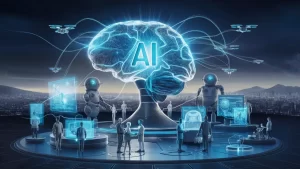AI virtual assistants can handle tasks such as scheduling meetings, writing emails, and creating quick meeting summaries. They can also assist with routine tasks like booking travel arrangements, ordering food delivery, or checking the weather forecasts. AI assistants support hands-free voice command usage and use machine learning and natural language processing technologies to understand human requests and anticipate needs based on user behavior.
1. Personalized Assistance
AI personal assistants use your data to provide recommendations tailored specifically for you. This ensures an enjoyable and tailored experience. AI assistants help you maximize the most out of each day by automating tasks, writing emails, and summarizing meetings – freeing up time for more important projects.
However, many users may be wary of using AI assistants due to privacy and potential bias issues associated with collecting their data. Therefore, companies must create trustworthy AI assistants that prioritize unbiased training data.
2. Automation
AI assistants make life simpler for users by offloading mental clutter associated with scheduling meetings, calendaring tasks, email drafting, and professional email composing – from scheduling meetings and calendar management to writing professional emails, ChatGPT can even automate weekly report tasks for ease of use.
Businesses utilizing AI technologies need tools that prioritize accuracy and efficiency while improving customer experiences. For instance, AI could assist a contact center agent quickly looking up procedures for dealing with an emergency gas leak. AI assistants’ capacity for complex task performance raises privacy issues. Additional research into context awareness, ambiguity handling, and safe generalization will be essential in making sure these tools bolster rather than replace human skills.
3. 24/7 Help
AI assistants provide assistance in various forms, from automating time management and reminders to document analysis. Thanks to advances in natural language processing and machine learning algorithms, these tools have the potential to take human-machine interactions to new heights.
AI aids users in managing complex tasks efficiently, relieving stress and increasing efficiency, so employees can focus their energies on higher-value work that increases productivity. AI personal assistants can enhance customer service and business intelligence by automating routine tasks and providing tailored assistance. However, such technology must be implemented responsibly so as to achieve its maximum potential.
4. Convenience
AI assistants can perform many of the mundane, time-consuming tasks for their users, freeing up time for more valuable work. AI can also assist with repetitive, monotonous work or automate workflows for optimal efficiency.
AI assistants can make scheduling meetings easy by copying you on emails, prioritizing and drafting to-do lists, summarizing lengthy emails with one voice command, and summarizing long ones all on their own. In addition, these assistants can manage calendars, find information, and control an increasing variety of smart devices at home and work. Privacy concerns – Some users fear their information could be leaked or misused by AI assistants, so to protect users, developers are improving transparency and user control of data storage solutions.
5. Streamlined Operations
AI assistants streamline operations by making it faster and simpler for businesses to meet customer demands quickly and accurately. These systems can instantly respond to requests or questions that come in, providing accurate answers based on real-time data analysis.
AI can be especially beneficial to businesses that deal with high volumes of repetitive and/or simple inquiries, as it helps cut costs by automating processes and freeing staff up for more strategic tasks. Concerns still remain regarding user privacy and overreliance on technology. More research must be conducted into human values and governance solutions so as to ensure these technologies enhance people rather than diminish what makes them unique.
6. Enhanced Customer Experience
Artificial intelligence assistants create a positive user experience by streamlining technology and quickly responding to customer queries. Their features help build user trust and increase customer satisfaction, leading to increased revenue growth. Intelligent agents equipped with natural language processing, linguistic models, and machine learning algorithms are capable of understanding user inputs to formulate responses. Furthermore, these agents can learn from past results to offer tailored assistance.
Users can connect with third-party apps and tools to streamline business processes while still remaining human-centric in order to avoid overdependence on these technologies. It is best if solutions integrate seamlessly with existing systems for optimal results.
7. Increased Productivity
AI assistants not only enhance productivity through automating tasks, but they can also enhance workflow efficiency by increasing human teams’ efficiency – this is particularly helpful in fields like healthcare and e-commerce, where accuracy is vitally important.
However, overreliance on these tools could weaken critical thinking abilities, so it is crucial to strike a balance between automation and human judgment. Furthermore, data privacy and training bias remain significant risks, though these risks can be reduced by choosing tools with robust security measures and clear privacy policies as well as tutorials or customer support available on certain platforms.
8. Enhanced Security
AI assistants can access data from multiple sources, making them ideal for research and content management. Furthermore, these assistants can interpret complex text, images, and tone for greater insight into human communication. Personalized recommendations based on user habits facilitate decision-making and time management, including music and content recommendations, rescheduling meetings due to traffic delays, or suggesting restaurants or sights of interest while traveling.
Strong governance and priorities that place human values first are necessary to fully realize the advantages of AI tools. By investing in multidisciplinary research in areas like ethics, technology, and policy, we can ensure future AI systems improve rather than diminish what makes us human.
9. Improved Efficiency
AI assistants can help businesses streamline their operations and offer customers a better customer experience by allocating resources more effectively while increasing efficiency, as well as improving overall productivity while decreasing costs.
AI assistants can assist in many ways – managing schedules, setting reminders, and tracking projects are among them. Furthermore, these assistants can perform searches, make reservations, and place orders all using voice command technology. However, AI assistants don’t come without challenges. Key among them include privacy, interpretability, and bias – given they rely on training data containing social biases, which might reflect them to generate responses and recommendations that further disadvantage some users.




